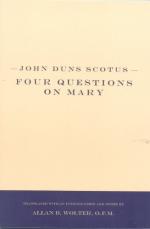|
This section contains 122 words (approx. 1 page at 300 words per page) |
c. 1266-1308
Scottish philosopher and theologian who helped establish the framework for the scientific method by distinguishing between causal laws and empirical generalizations. The author of numerous works, including commentaries on Aristotle, Duns Scotus outlined a philosophical theory that came to be known as Scotism, in opposition to the Thomism of Thomas Aquinas and his adherents. Among the notions put forth by Duns Scotus was the idea that matter, as matter, has some verifiable existence and reality all its own. The stubbornness and obstructionism of his followers, in the face of the changes associated with the Renaissance, led to the coining of the term "dunce" to describe someone unable or unwilling to recognize an obvious fact.
|
This section contains 122 words (approx. 1 page at 300 words per page) |


